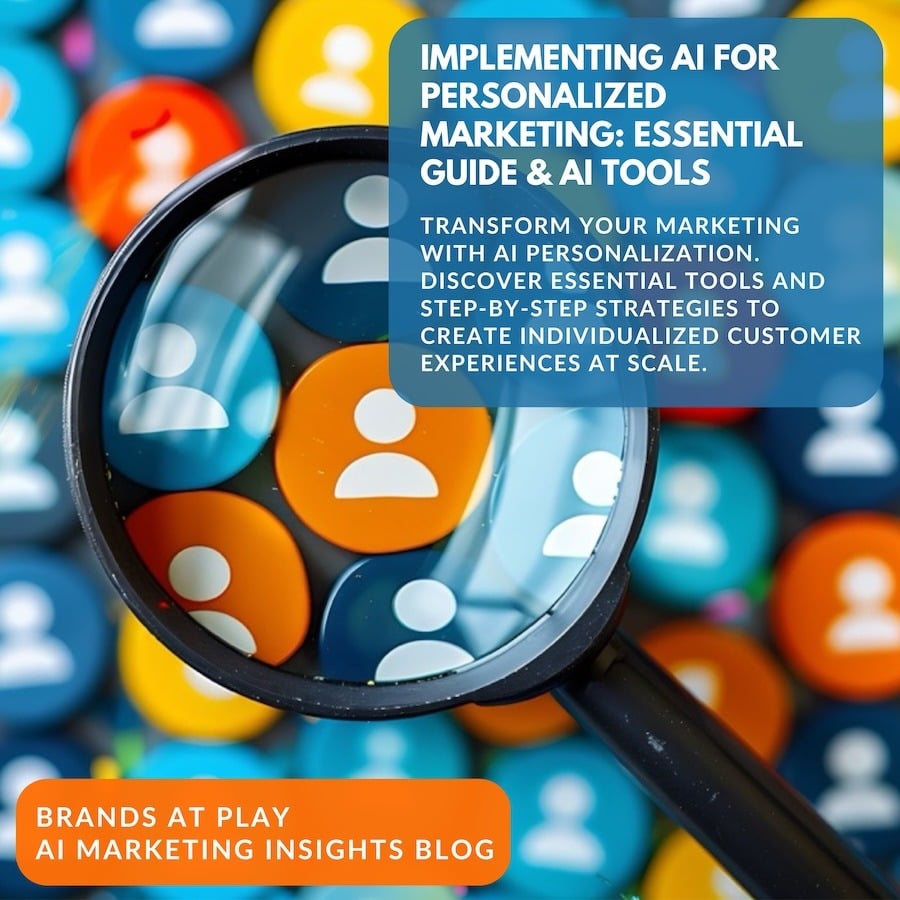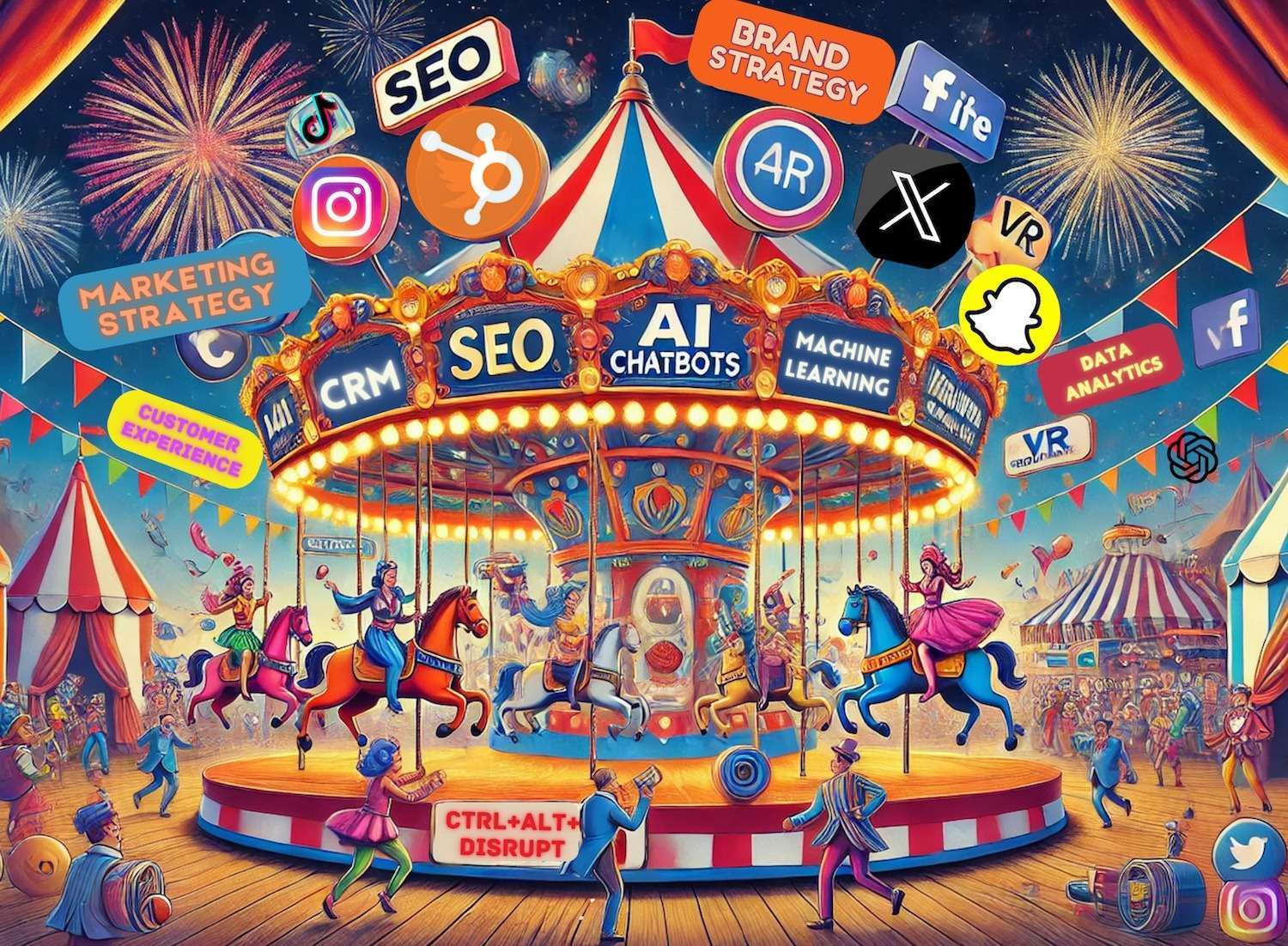How AI Transforms Real-Time Marketing: Ultimate Campaign Optimization
The Evolution of Real-Time Marketing Marketing campaigns once moved at the speed of human analysis, but artificial intelligence has fundamentally...
10 min read
Stephanie Unterweger : Dec 3, 2024 11:16:33 AM


According to Salesforce's State of the Connected Customer Report, 73% of consumers expect companies to understand their unique needs and expectations. Yet delivering truly personalized experiences at scale has long been the holy grail of marketing, seemingly out of reach for many organizations. That's where artificial intelligence and personalized marketing come in, transforming what was once impossible into a practical reality.
Personalized marketing is a strategic approach that tailors messages, offers, and experiences to individual consumers using data insights drawn from their behavior, preferences, demographics, and past interactions. Rather than delivering one-size-fits-all campaigns, it leverages detailed customer data to create highly relevant experiences that foster engagement, loyalty, and ultimately drive revenue growth.
The concept of personalized marketing has evolved significantly over the past few decades. Initially emerging from early direct mail and segmented email campaigns, marketers soon recognized the value of addressing customers as individuals. With the rise of digital technology, the explosion of data, and the advancement of artificial intelligence (AI) and machine learning, personalized marketing has transformed from rudimentary segmentation into sophisticated, real-time customization at scale. This evolution has made it possible for even large organizations to deliver bespoke experiences to millions of customers simultaneously.
The effectiveness of personalized marketing is well-documented:
These insights demonstrate that personalization not only enhances customer satisfaction but also directly contributes to improved business performance.
Across industries, personalized marketing is no longer a luxury—it's an expectation. Businesses from retail and hospitality to finance and technology are harnessing AI-driven personalization to deliver tailored customer journeys. Forecasts by Forrester and other market research firms indicate robust growth in personalized marketing technologies, as companies increasingly invest in advanced analytics and automation tools to stay competitive in an ever-evolving digital landscape.
Here are some compelling examples of how major brands have successfully implemented personalized marketing strategies:
Starbucks:
Leveraging its mobile app and loyalty program, Starbucks personalizes offers and recommendations based on customers’ purchase history, location, and preferences. This tailored approach not only drives repeat visits but also enhances the overall customer experience.
Nike:
Through its Nike app and the Nike+ ecosystem, Nike delivers customized workout plans, product recommendations, and exclusive content tailored to individual fitness goals and shopping habits. This digital personalization deepens customer engagement and reinforces brand loyalty.
Airbnb:
Airbnb personalizes search results and accommodation recommendations by analyzing past bookings, search behavior, and user preferences. This ensures that travelers receive suggestions that match their unique interests, leading to more satisfying and memorable travel experiences.
Domino's Pizza:
Domino's leverages data analytics to offer personalized promotions and streamline the ordering process through its app. By tailoring deals and recommendations to individual tastes and ordering habits, Domino's has significantly boosted conversion rates and customer retention.
Each of these examples demonstrates how personalized marketing transforms raw customer data into actionable insights, enabling brands to create highly relevant, engaging, and effective marketing campaigns.
The numbers tell a compelling story. Companies leveraging AI for personalization are seeing dramatic results. Accenture's research shows that 91% of consumers are more likely to shop with brands that provide relevant, personalized offers and recommendations.
Consider Netflix, which saves an estimated $1 billion annually through its personalization efforts. Their recommendation system drives 80% of content discovery, with even show thumbnails dynamically personalized based on viewing history. Similarly, Spotify's AI-powered Discover Weekly feature serves over 40 million users, driving 30% of total listening time through personalized playlists.
In the retail space, Sephora's implementation of their Color IQ system for personalized product recommendations, combined with their Virtual Artist feature for makeup try-ons, led to an 11% increase in conversion rates. These success stories aren't outliers—they're becoming the new standard for customer experience.
At its core, effective personalization requires two key elements: quality data and sophisticated AI technologies to make sense of it. The most valuable data types include:
This data becomes truly powerful when processed through advanced AI technologies. Machine learning models use techniques like collaborative filtering (recommending items based on similar users' preferences) and content-based filtering (recommendations based on item attributes). Natural Language Processing (NLP) enables sentiment analysis and content categorization, making communications more relevant and engaging.
While the data and technology foundations are crucial, the true value of AI personalization emerges in its practical applications. Organizations across industries are finding innovative ways to deploy these capabilities, transforming raw data and sophisticated algorithms into meaningful customer experiences. From email campaigns to dynamic website experiences, these practical applications demonstrate how theoretical potential translates into tangible business results. Let's examine the key areas where AI personalization is making the most impact and the best practices that drive success.
Email personalization remains one of the most effective starting points. Beyond basic name insertion, AI can optimize:
Website personalization can include:
While email and website personalization form the foundation, leading organizations are pushing the boundaries of what's possible with AI-driven personalization. These sophisticated applications demonstrate the full potential of combining rich data with advanced AI capabilities:

Personalization should extend seamlessly across email, social media, websites, and offline interactions. Advanced use cases include:
AI algorithms can detect specific user actions or inactions and trigger personalized responses in real time:

Sophisticated AI tools analyze consumer behavior, intent, and preferences to deliver hyper-relevant content:
E-commerce platforms can take advantage of AI to provide a completely personalized shopping journey:
Implementing an AI-driven personalization strategy involves selecting appropriate tools at each phase to ensure effectiveness and scalability. Below is a detailed guide outlining each phase, accompanied by recommended AI tools and platforms suitable for each step:
Objective: Establish a solid groundwork for your personalization strategy.
Audit Your Data Infrastructure
Define Personalization Goals
Select Key Metrics to Measure Success
Choose Tools and Technology
Tool Recommendation: G2.com
Description: G2 is a leading peer-to-peer review platform for business software and services. It provides detailed reviews, ratings, and comparisons across thousands of AI and marketing tools, helping businesses identify the best-fit solutions for their needs. G2's vast database allows users to filter tools based on features, pricing, and real-world feedback, ensuring informed decisions when selecting platforms for customer data management, marketing automation, and personalization.
5. Develop a Clear Roadmap
Objective: Test and refine personalization efforts on a small scale.
Select a Target Segment
Implement Basic Personalization
Collect and Analyze Data
Gather Feedback
Iterate and Optimize
Objective: Expand personalization efforts across channels and audiences, leveraging advanced AI capabilities.
Integrate Additional Channels
Deploy Advanced AI Capabilities
Automate for Efficiency
Monitor and Report Performance
Refine Your Strategy
By integrating these tools at each phase, your business can effectively implement and scale an AI-driven personalization strategy, leading to enhanced customer engagement and improved ROI.

Adobe Experience Cloud is a comprehensive suite designed to manage and optimize customer experiences across all touchpoints. It integrates analytics, content management, personalization, and marketing automation, enabling businesses to deliver consistent and personalized experiences.
By leveraging these integrated tools, businesses can effectively orchestrate personalized marketing strategies and measure their impact.
Learn more: Adobe Experience Cloud
HubSpot provides a unified platform encompassing marketing, sales, customer service, and CRM functionalities. Its marketing hub includes AI-driven features that enhance email personalization, predictive lead scoring, and detailed analytics, allowing marketers to create cohesive and data-driven campaigns.
HubSpot's robust suite of tools makes it a preferred choice for businesses aiming to integrate various marketing and sales functions seamlessly.
Learn more: HubSpot
Bloomreach is a cloud-based e-commerce experience platform specializing in marketing automation, product discovery, and content management. It enables businesses to deliver personalized experiences across digital channels, enhancing customer engagement and conversion rates.
By integrating these capabilities, Bloomreach helps businesses create cohesive and personalized customer journeys.
Learn more: Bloomreach
ActiveCampaign offers cloud-based marketing and sales automation software with features for email marketing, lead scoring, web analytics, CRM, and live chat messaging. In 2023, it introduced generative AI capabilities to enhance its automation features.
ActiveCampaign integrates with over 900 applications, including Salesforce, WordPress, Shopify, and Facebook, providing flexibility and scalability for businesses.
Learn more: ActiveCampaign
By adopting these comprehensive platforms, businesses can effectively implement and scale AI-driven personalization strategies, leading to enhanced customer engagement and improved ROI.
The right technology stack is crucial for successful personalization. Here are some leading platforms to consider:
For Customer Data Platforms:
For Personalization Platforms:
For AI/ML Tools:

Success in AI personalization should be measured across multiple dimensions:
The most successful organizations create comprehensive dashboards tracking these metrics, allowing them to continuously optimize their personalization efforts. Please check out our article on 12 KPIs for Explosive Growth for more insights on what to monitor for successful personalized marketing campaigns.
As AI technology continues to evolve, we're seeing emerging trends in personalization, including:
However, with great power comes great responsibility. Privacy considerations are paramount, with organizations needing to balance personalization with data protection. Focus on building trust through transparency about data usage and ensuring compliance with privacy regulations.
The journey to AI-powered personalization may seem daunting, but the key is to start small and scale based on results. Begin by:
Remember, personalization is not a destination but a journey of continuous improvement. The organizations that succeed are those that commit to ongoing testing, learning, and optimization.
Personalized marketing tailors messages, offers, and experiences to individual consumers using data insights from behaviors, demographics, and past interactions. By leveraging AI and machine learning, brands can create highly relevant content that boosts customer engagement and drives conversions.
AI-driven personalization analyzes real-time customer data to deliver targeted content across digital channels. This approach ensures that each interaction is relevant to the individual, leading to increased engagement, improved satisfaction, and stronger brand loyalty.
The benefits include increased conversion rates, higher revenue, improved customer loyalty, and more efficient marketing spend. Tailored experiences help build deeper customer relationships and result in a better overall customer experience.
Businesses can begin by gathering customer data from multiple touchpoints, such as websites and mobile apps, and then leveraging marketing automation tools and customer data platforms (CDPs) to segment audiences. This strategy lays the foundation for delivering targeted and impactful personalized campaigns.
Customer data is the cornerstone of personalized marketing. It provides insights into consumer behavior, preferences, and purchase history, which are essential for crafting tailored messages that resonate with each individual customer.
Studies have shown that companies using personalized marketing can see revenue increases of up to 40%. By delivering relevant offers and content, businesses experience improved conversion rates and enhanced customer retention, leading to significant revenue growth.
Brands such as Starbucks, Nike, Airbnb, and Domino's Pizza have successfully implemented personalized marketing strategies. These companies use customer data and AI-driven insights to tailor promotions and recommendations that drive engagement and boost sales.
By delivering customized content and offers based on individual customer preferences, personalized marketing creates a more engaging and meaningful experience. This tailored approach helps build trust and loyalty, leading to higher customer satisfaction.
Technologies such as machine learning, natural language processing (NLP), and advanced analytics power AI-driven personalization. Marketing automation platforms, customer data platforms, and real-time data processing systems are also essential for executing effective personalized campaigns.
Small businesses can start with affordable marketing automation and analytics tools to collect and analyze customer data. By focusing on high-impact areas like email personalization and targeted social media campaigns, they can implement cost-effective strategies that drive engagement and increase conversion rates.
At Brands at Play, we transform personalized marketing into an art and science that drives real results. Our cutting-edge, AI-powered strategies are built on deep industry insights and a commitment to understanding your unique brand needs. Unlike traditional approaches, we harness advanced data analytics and creative innovation to deliver tailor-made campaigns that resonate with your audience at every touchpoint. Ready to elevate your customer engagement and boost revenue? Partner with us and experience how our expertise in crafting personalized marketing journeys can set your brand apart. Contact Brands at Play today and let’s start turning your customer data into powerful, personalized experiences that inspire loyalty and growth.

The Evolution of Real-Time Marketing Marketing campaigns once moved at the speed of human analysis, but artificial intelligence has fundamentally...

Explore the ROI and best practices for AI-powered personalized marketing using real brand case data.

The marketing landscape of 2025 demands a fundamental shift in how we approach brand strategy. Artificial intelligence (AI) is no longer a...